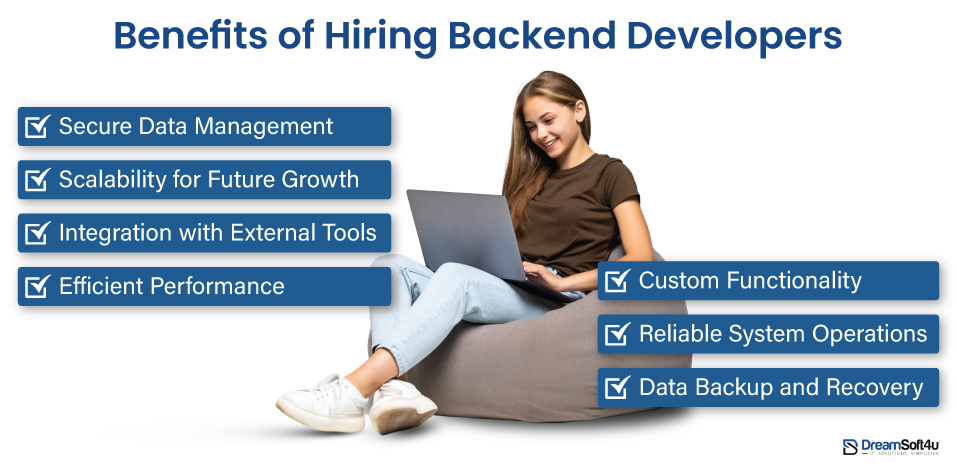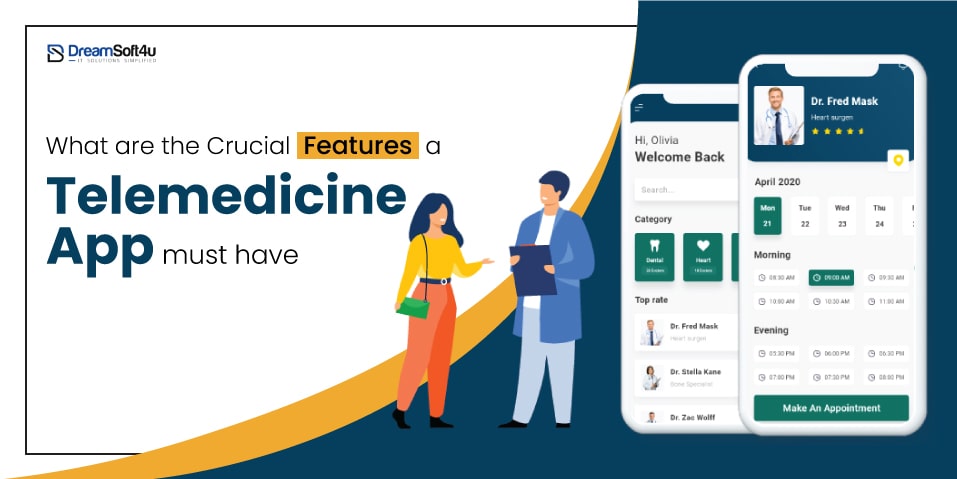Building a website or app is important for modern businesses. With a custom application, users can stay ahead in the competitive world. However, you need the right team of developers to develop a successful platform for your business. Most people question which is better and who can give top output frontend vs. backend developer. Although, they work together but have different tasks.
Frontend developers focus on what users see. They handle the design, layout, and interactive features. These professional developers make your website or app look good and easy to use. Backend developers manage the processes behind the scenes. They work with databases, servers, and overall functionality. The primary role of the backend is to ensure everything works smoothly and securely.
As a business owner, it is important to understand these roles and how they function. So, by knowing their responsibilities, you can decide which developer fits your needs. This article will explain their roles and guide you in making the best choice for your business.
Table of Contents
ToggleWhat is Frontend Development?
Frontend development describes the features of a website that should be visible to users, also known as the user interface. A frontend developer makes the code look good and functions smoothly on the computer. They use tools that translate designs into live websites, so they create things like buttons, menus, and animations.
Additionally, they ensure the website works on all devices (phones and desktops). The main motive of frontend development is to facilitate easy website usage. It also helps ensure the site using your email address looks professional and attractive.
What is Backend Development?
Backend development is the part of a website or app that users do not see. It focuses on how the website works, including managing servers, databases, and app logic. A backend developer ensures data flows between the frontend and backend, handles things like user authentication and data storage, and ensures everything processes correctly. The main goal of backend development is to ensure the website runs smoothly. It manages data, supports scalability, and keeps everything secure.
When to Hire a Frontend Developer
- Your website needs a custom design to stand out. Frontend developers create unique and engaging designs tailored to match your business and attract users.
- You want to improve users’ experience on your website. A frontend developer ensures smooth navigation and makes it easy for users to find what they need.
- Your platform must work well on all devices. Frontend developers create mobile-friendly designs that perfectly adapt to phones, tablets, and desktops.
- You want interactive features for better engagement. Frontend developers add animations, sliders, or pop-up forms to make your website more engaging and dynamic.
- Your brand identity must reflect on your platform with the help of a full-stack developer. Frontend developers ensure the design aligns with your company’s values and creates a professional look.
- You need a visually polished website that looks modern. Frontend developers focus on the visual appeal to make your site attractive and user-friendly.
- Your platform needs to be accessible to all users. Frontend developers ensure the design is accessible for people with different needs, enhancing usability for everyone.
When to Hire a Backend Developer
- Your website requires handling complex data processes. Backend developers build systems that manage orders, user profiles, and other operations seamlessly.
- You need secure systems for user accounts. Backend developers create safe authentication processes to protect sensitive data and user information.
- Your project involves integrating external tools. Backend developers connect your website with payment systems, analytics platforms, or other third-party services.
- Your business expects many users to access your site. Backend developers create systems that handle high traffic smoothly without crashing.
- Your platform must support future growth during Web development. Backend developers design scalable systems that grow with your business needs.
- You want a fast-loading website that performs well. Backend developers optimize servers and databases for quicker response times.
- Your project requires advanced logic for custom features. Backend developers build complex workflows, like automated calculations or personalized dashboards, for your specific business requirements.
Skills of Frontend Developers
Frontend developers need specific skills to do their job well. These skills include:
- HTML: This is used to structure content on the website.
- CSS: To style the website and make it look attractive.
- JavaScript: To add interactive features like animations and forms.
- Responsive Design: Ensures the site looks good on all devices.
- Frameworks: Knowledge of tools like React, Angular, or Vue.js.
Skills of Backend Developers
Backend developers also require technical skills to handle server-side tasks. Their skills include:
- Programming Languages: Proficiency in Python, Java, Ruby, PHP, or Node.js.
- Database Management: Knowledge of SQL databases like MySQL or NoSQL databases like MongoDB.
- API Development: Ability to create and maintain APIs for data exchange.
- Server Management: Experience with cloud platforms like AWS or Google Cloud.
- Security: Skills to implement encryption and authentication systems.
Benefits of Hiring Frontend Developers

1. Improved User Experience: A frontend developer ensures your website is easy to navigate. They create an intuitive design that helps users find information quickly and enjoy their experience. It keeps users engaged longer.
2. Professional Appearance: Frontend developers make your website look polished and modern. They use the latest design trends to ensure your platform appears trustworthy and leaves a positive impression on visitors.
3. Faster Development: Frontend developers build websites quickly using frameworks like React or Angular. To launch your business faster, they streamline the process without compromising quality and deliver the best output.
4. Mobile-Friendly Design: Your Custom Web Application must work beautifully on all devices; frontend developers ensure this. They design responsive layouts that adjust to phones, tablets, and desktops for the same user experience.
5. Brand Consistency: Frontend Developers create designs according to a company’s identity. This guarantees that your platform is recognizable not just through colors and typography but also through services.
6. Interactive Features: From a frontend developer’s perspective, they add engaging features such as animations, sliders, and dropdowns. These features improve user engagement and increase user satisfaction with your website, making it dynamic.
7. Accessibility for All Users: As your frontend developer, your job is to ensure your website meets accessibility standards. They do this by creating platform features that can cater to different people, meaning your platform is inclusive and accessible to anyone.
Benefits of Hiring Backend Developers

1. Secure Data Management: Backend developers protect the data, such as customer information and payments. They encrypt and authenticate your platform from cyber threats and unauthorized information.
2. Scalability for Future Growth: As your business grows, your backend developers design systems that can handle the increased traffic and data you will generate. That means you can be sure they will keep your platform ready as new demands arise.
3. Integration with External Tools: Backend developers integrate your platform with third parties like payment gateways, analytics tools, and marketing platforms. These integrations are good for functionality and streamlining operations also in UI/UX design services.
4. Efficient Performance: Backend developers optimize your server and database for faster load times. It ensures your website or app performs well, even during peak usage periods, keeping users satisfied.
5. Custom Functionality: Backend developers create tailored features to meet your unique business needs. From automated workflows to real-time analytics, they design solutions that support your specific goals.
6. Reliable System Operations: A backend developer ensures the website runs smoothly without crashes. They build robust infrastructures that seamlessly handle tasks like data processing, storage, and system updates.
7. Data Backup and Recovery: Backend developers implement systems for regular backups and quick recovery. It ensures that your data remains safe and accessible even during unexpected events like server failures.
Frontend vs Backend: Which is Better for Your Business?
Below are five simple (and non-exclusive) situations to consider when deciding whether to hire full stack developer or frontend or backend developer for your business.
1. You Need a Visually Appealing Website
If your goal is to create a website or app that looks great and represents your brand, focus on frontend development. Frontend developers design layouts that match your style. They choose colors, fonts, and images to reflect your business. They also make the interface clean and professional. A visually appealing website makes a strong first impression. It encourages users to stay and explore more. It is ideal for customer-facing platforms like online stores or marketing sites.
2. Your Project Handles Complex Data
You don’t need backend development if your app or website doesn’t handle large amounts of data like customer details, orders, product catalog, etc. Backend developers are systems that work efficiently to handle and process data. Depending on the site, an eCommerce site requires a backend to manage inventory, make payments, and store customer information. The frontend might look beautiful, but it won’t work if you don’t have a good backend. Backend development ensures there are no errors or delays in operations.
3. You Require Mobile-Friendly and Interactive Features
Frontend Framework is chosen if the website has to be functional on all devices or if it has to include features like animations or forms. The reason why frontend developers exist is to make your platform responsive. Thus, it should look good on phones, tablets, and desktops. These folks add interactive bits like sliders, menus, and animations to allow users to interact with pages. With these elements, your website is enjoyable and easily usable. It’s also important to keep users on your site and convert them into customers.
4. Your Business Needs Secure User Authentication
If you have users who need to log in or handle sensitive data on your website or app, you’ll need backend development. Backend developers are responsible for the construction of secure systems that prevent users’ accounts and information from being accessed. They keep data safe using encryption, password protection, and authentication tools. This is important for industries such as banking, healthcare, and eCommerce. The backend takes care of making you and your users trust you and keeping your business compliant with security standards.
5. You Want a Scalable System for Growth
If you expect your business to grow and handle more users over time, focus on backend development. Backend developers build systems that can scale easily. For example, if your platform serves 1,000 users now but needs to support 10,000 users in the future, they design a backend that can grow. They optimize servers and databases to handle increased traffic smoothly, ensuring your platform stays reliable as your business expands.
Ready to build a functional and visually appealing platform?
Hire expert frontend and backend developers today and bring your vision to life!
The Importance of Collaboration Between Frontend and Backend Developers
Frontend developers vs backend developers have distinct roles. However, their collaboration is essential for a successful project. Working together helps you ensure seamless integration between the user interface and backend systems. It results in creating a smooth and functional product. When both teams collaborate, problems are identified and resolved quickly, improving efficiency and reducing delays. This teamwork also enhances the user experience by ensuring the website or app looks good and performs well. Clear communication between the teams avoids rework and ensures that updates, new features, and improvements are implemented consistently and effectively.
- Seamless integration of backend data into the frontend interface.
- Faster identification and resolution of issues.
- Improved user experience with well-coordinated efforts.
- Efficient development with fewer delays and miscommunications.
- Consistent updates and smooth implementation of new features.
Conclusion
Frontend developers vs backend developers are essential for creating websites and applications. Meanwhile, frontend developers focus on design and making the platform user-friendly. On the other hand, backend developers handle data and ensure everything works smoothly. Both roles are important and depend on what your project needs. If you want a visually appealing platform, hire a frontend developer. If your project needs secure and scalable systems, go for a backend developer. Often, you need both to create a successful product that is functional and user-friendly.
FAQs
1. What is the main difference between frontend and backend developers?
Frontend developers handle design and user interactions, while backend developers manage servers, databases, and functionality.
2. Can one developer manage both frontend and backend tasks?
Yes, a full-stack developer can handle both frontend and backend development, but specialization is often preferred for complex projects.
3. When should I hire a frontend developer?
Hire a frontend developer when you need a visually appealing, interactive, and user-friendly platform that works well on all devices.
4. Why is backend development critical for my project?
Backend development ensures secure data management, smooth functionality, scalability for growth, and integration with external tools.
5. Do frontend and backend developers need to work together?
Yes, collaboration ensures the platform is both functional and visually appealing, improving the user experience.



















